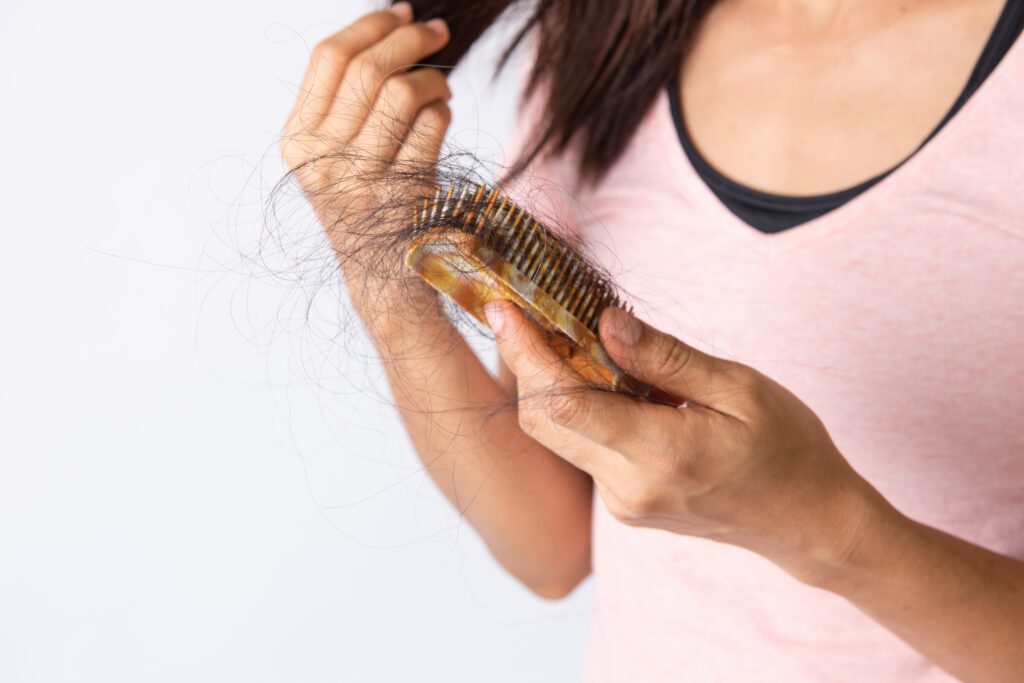Test Your Knowledge to Get to the Root of Your Hair Loss
They say your hair is the crown you never take off, but what if that crown has been tarnished by hair loss? There are many reasons why your hair may be thinning, and you need to figure out those reasons before turning to a solution. Take our quiz to get to the root of your hair loss and learn about treatment options.
1. True or false? Hereditary hair loss, or androgenic alopecia, which can develop in both men and women, is the most common cause of hair loss worldwide.
2. Which of the following is true of androgenic alopecia?
A. Your inherited genes cause your hair follicles (what each hair grows out of) to shrink and eventually stop growing hair.
B. Hair loss can begin as early as your teens, but it usually starts later in life.
C. In women, the first noticeable sign is usually overall thinning or a widening part; in men, it’s often a receding hairline or bald spot at the top of the head.
D. The earlier treatment is started, the better it works. Without treatment, you will continue to lose hair.
E. All of the above
3. Which of the following is NOT a treatment for androgenic alopecia?
A. Prescription medications, like finasteride (Propecia).
B. Hair transplant surgery where small plugs of skin, each with a few hairs, are transplanted to bald parts of your scalp.
C. Using essential oils on your scalp.
D. Over-the-counter medications such as topical creams, gels, solutions, or foams that usually contain an ingredient called minoxidil that you apply directly to the scalp.
4. True or false? Hair loss is a natural part of aging because hair growth slows and hair follicles stop growing hair, which causes the hair on our scalp to thin.
5. Being too low in which of the following nutrients can cause hair loss?
A. Biotin
B. Iron
C. Protein
D. Zinc
E. All of the above
6. True or false? If you have a problem with your thyroid, you may see thinning hair.
7. True or false? Hair loss can be a side effect of many medications.
8. Which of the following is the most important step you should take if you suspect a lack of nutrients, your thyroid, or a medication is to blame for hair loss?
A. Start taking a multivitamin.
B. See your doctor for testing.
C. Eat a healthy diet.
D. Quit smoking and/or drinking.
9. True or false? Childbirth, illness, or other stressors in your life can cause hair loss, but once the stressor stops, most people see their hair regain its normal fullness within six to nine months.
10. Which of the following are parts of your haircare routine that can cause hair loss?
A. Getting treatments that color, perm, or relax your hair.
B. Wearing a hairstyle that pulls on your scalp too often, such as wearing your hair tightly pulled back.
C. Wearing something that constantly causes friction on your skin, such as a headband or hat.
D. All of the above
11. What are other conditions that could cause hair loss that your doctor can diagnose and/or treat?
A. Alopecia areata, a disease that develops when the body’s immune system attacks hair follicles.
B. A hormonal imbalance, such as polycystic ovary syndrome (PCOS).
C. A scalp infection; Cicatricial alopecia, where inflammation destroys your hair follicles; or plaque psoriasis on the scalp.
D. An STD or trichotillomania, where people pull on their hair, often to relieve stress.
E. All of the above
compiled by ERIKA ALDRICH / Information from the American Academy of Dermatology Association and Healthline
ANSWERS:
- True. Hereditary hair loss is the most common cause of hair loss.
- E. All of the above
- C. Using essential oils on your scalp. Essential oils cannot help treat hereditary hair loss.
- True. Hair will naturally thin with age.
- E. All of the above. Reversing nutrient deficiencies should cause your hair to regrow.
- True. Thyroid problems can cause hair loss.
- True. Many medications can cause hair loss.
- B. Seeing your doctor is the best option for figuring out what is causing hair loss.
- True. Stress and stressful events like illness and childbirth can cause hair loss.
- D. All of the above. Changing your haircare routine will usually halt hair loss, though sometimes hair will not grow back.
- E. All of the above. Seeing a doctor about hair loss is the best way to figure out the causes and potential treatments.
